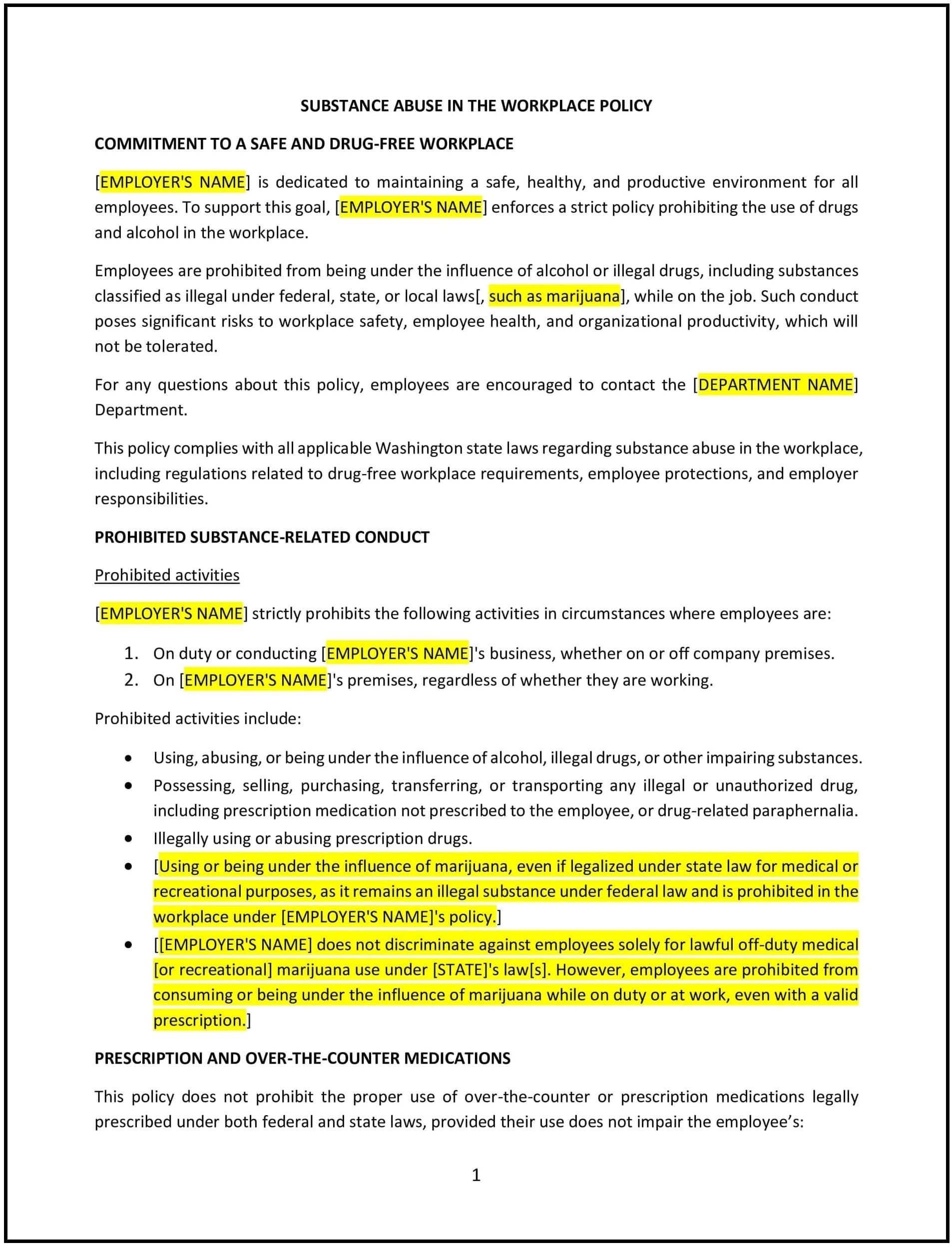Substance abuse in the workplace policy (Washington): Free template
Got contracts to review? While you're here for policies, let Cobrief make contract review effortless—start your free review now.

Customize this template for free
This substance abuse in the workplace policy is designed to help Washington businesses address the use of drugs and alcohol in the workplace. The policy outlines the company’s stance on substance abuse, provides guidelines for identifying and addressing substance-related issues, and establishes procedures for handling violations. It aims to create a safe and productive environment for all employees while complying with Washington state and federal laws regarding substance abuse.
By adopting this policy, businesses can maintain a drug-free workplace, promote employee health and safety, and reduce the risks associated with substance abuse.
How to use this substance abuse in the workplace policy (Washington)
- Define substance abuse: The policy should clearly define what constitutes substance abuse, including the use of illegal drugs, misuse of prescription medication, and the abuse of alcohol or other substances that impair an employee’s ability to perform their job.
- Specify workplace restrictions: The policy should specify where and when substance use is prohibited, such as during work hours, while on company premises, or while operating company vehicles. It should clarify whether employees are allowed to use substances during breaks or lunch periods, and under what circumstances such use may be allowed (e.g., medical marijuana, legal alcohol consumption).
- Establish testing procedures: The policy should outline the circumstances under which employees may be required to undergo drug and alcohol testing, such as pre-employment testing, random testing, testing after an accident or incident, or reasonable suspicion testing. It should also specify the process for conducting tests, including who will administer the tests and how results will be handled.
- Address rehabilitation and support: The policy should provide guidance on how employees struggling with substance abuse issues can seek help. This may include offering support for rehabilitation programs, Employee Assistance Programs (EAPs), or counseling services, while emphasizing the company’s commitment to employee health and safety.
- Specify consequences for violations: The policy should outline the consequences for violating the substance abuse policy, including disciplinary actions ranging from warnings to termination, depending on the severity of the violation. The policy should also make it clear that violations related to illegal substance use will result in more severe consequences.
- Ensure compliance with Washington and federal laws: The policy should ensure compliance with Washington state laws, such as the Washington State Liquor and Cannabis Board regulations, and federal regulations, including the Drug-Free Workplace Act, while allowing for reasonable accommodations where required (e.g., for medical marijuana use).
- Review and update regularly: Periodically review and update the policy to ensure it remains compliant with Washington state laws, federal regulations, and any changes in company operations. Regular updates will help ensure the policy stays relevant and effective.
Benefits of using this substance abuse in the workplace policy (Washington)
This policy offers several benefits for Washington businesses:
- Promotes a safe and productive workplace: By addressing substance abuse, the policy helps maintain a safe, productive, and professional environment for all employees, reducing the risks of accidents, errors, and workplace injuries.
- Reduces the risk of legal issues: The policy improves compliance with Washington state and federal laws regarding substance use in the workplace, helping businesses avoid legal liabilities or regulatory penalties.
- Supports employee health and well-being: Offering support for employees struggling with substance abuse shows that the company cares about their health and is committed to providing resources to help them recover.
- Improves employee morale: A drug-free workplace fosters an environment of trust, respect, and professionalism, improving employee morale and engagement.
- Reduces absenteeism and turnover: Addressing substance abuse early on and offering support can reduce absenteeism, presenteeism, and turnover, helping businesses retain a healthy and productive workforce.
- Enhances company reputation: Businesses that implement effective substance abuse policies are seen as responsible employers who prioritize the safety, well-being, and success of their employees.
Tips for using this substance abuse in the workplace policy (Washington)
- Communicate the policy clearly: Ensure that all employees are aware of the substance abuse policy and understand the consequences of violating it. Include the policy in the employee handbook, review it during onboarding, and provide periodic reminders.
- Encourage open communication: Foster an open dialogue about substance abuse and its potential impact on the workplace. Encourage employees to seek help if they are struggling with substance abuse, and provide support through rehabilitation programs or counseling services.
- Provide training for managers: Train managers to identify signs of substance abuse, understand how to handle situations involving substance abuse, and enforce the policy consistently and fairly.
- Enforce the policy consistently: Ensure that the policy is consistently enforced across the organization. Take appropriate action when violations occur, and ensure that all employees are treated fairly and equitably under the policy.
- Monitor the effectiveness of the policy: Regularly assess the effectiveness of the policy and make adjustments as necessary to ensure it is meeting the needs of the business and its employees.
- Review and update regularly: Periodically review the policy to ensure it remains compliant with Washington state laws, federal regulations, and any changes in the company’s operations. Regular updates will help keep the policy relevant and effective.